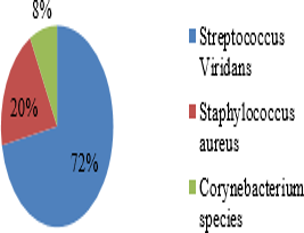Abstract
An odontogenic infection is an alveolar, jaw, or facial infection that is caused by a tooth or its supporting structures and is one of the most common infections. Dental caries, heavy restorations or unsuccessful endodontic treatment, pericoronitis and periodontal infection are by far the most likely reasons for odontogenic infections. Infections are typically clustered around teeth and may stay concentrated to the region where it began, and may propagate to neighbouring or distant locations. The questionnaire included questions regarding essential knowledge and understanding of the Management of odontogenic space infections. Responses were obtained, and the data were analyzed. 72% of the respondents have said streptococcus viridans is the most common microorganisms in odontogenic infection, 57% said they would give antibiotics, incision and drainage for canine space infection, 63% said they would give antibiotics, incision and drainage for submandibular infection space infection, 57% said their first choice of antibiotic in managing space infection is Amoxicillin, and 53% said clindamycin is the choice of antibiotics in patients allergic to Amoxicillin. Most of the dental practitioners in this study did not have complete knowledge regarding the new generations of cephalosporins rather; they were aware of the 3rd and 4th generation cephalosporins. More education and understanding will improve the effectiveness of use and solve the difficulties faced in dentistry.
Full text article
Authors

This work is licensed under a Creative Commons Attribution-NonCommercial-NoDerivatives 4.0 International License.

